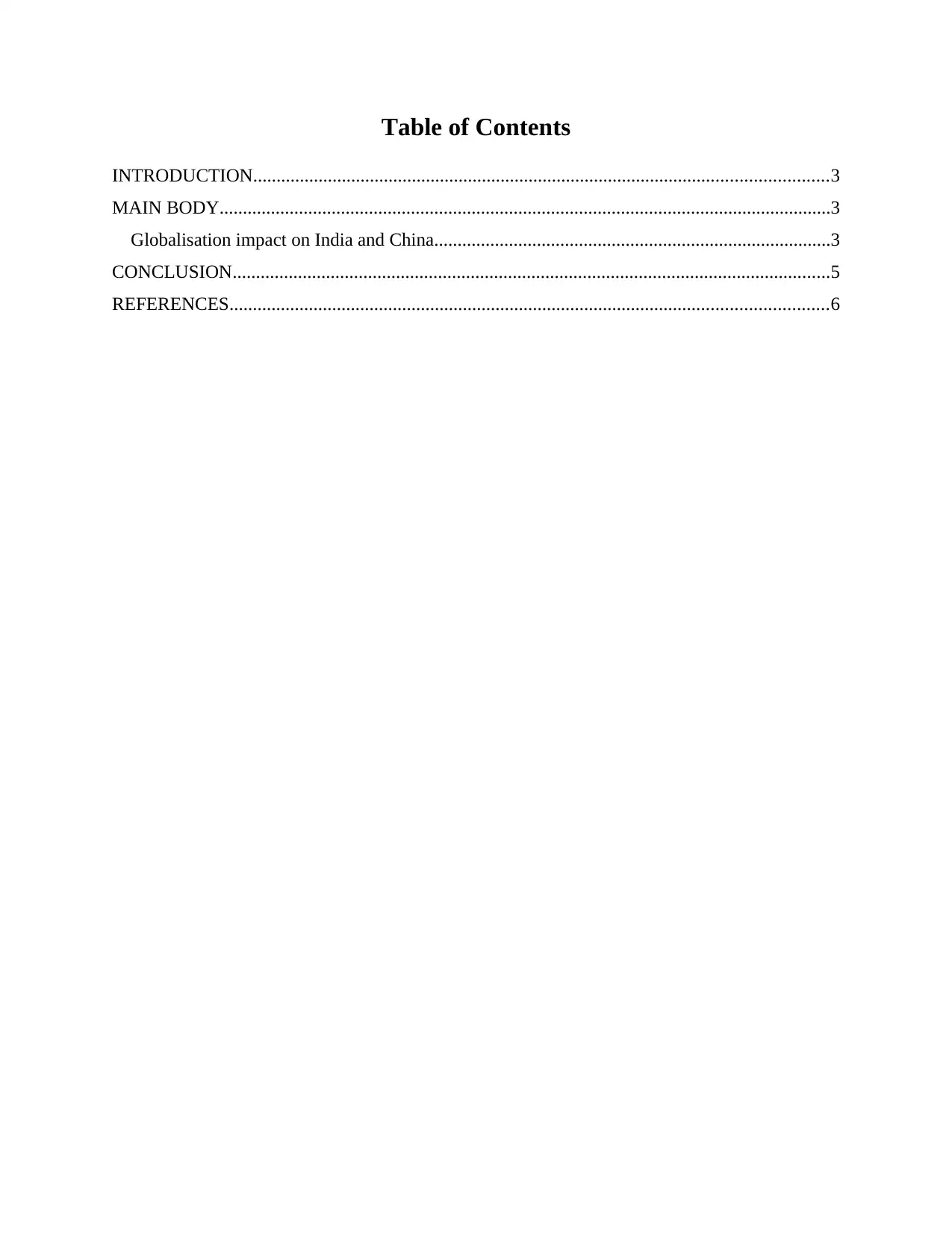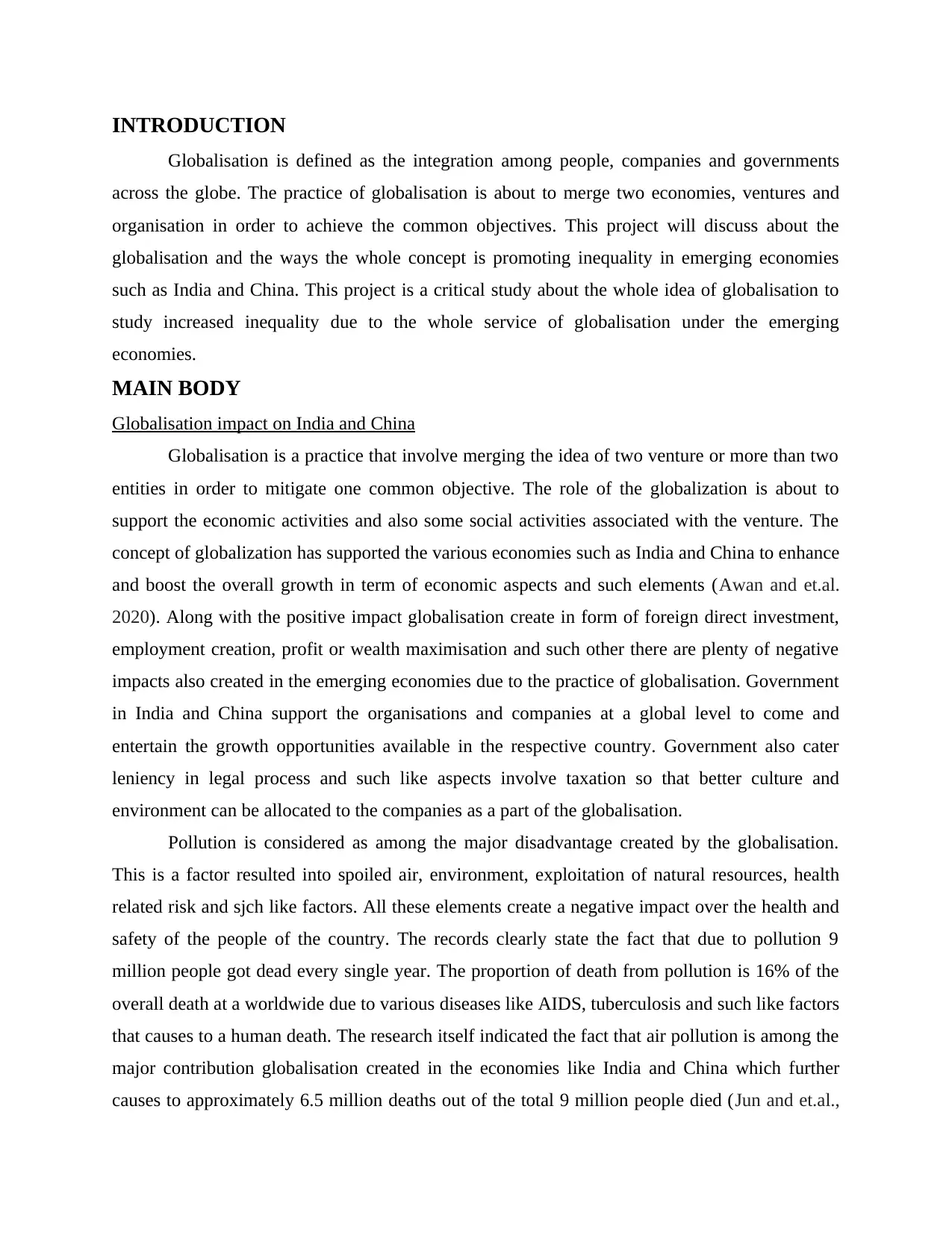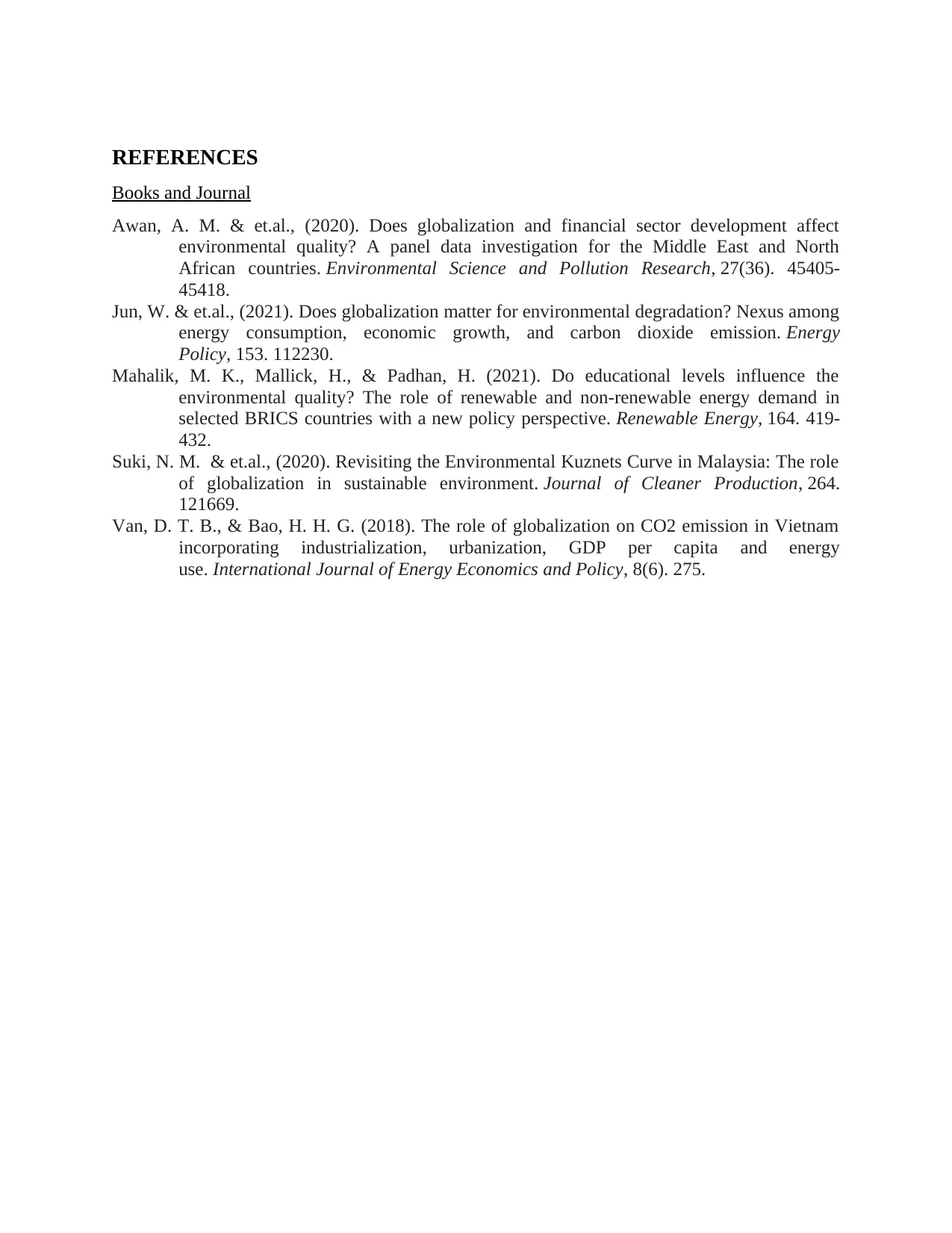The Role of Globalization in Driving Inequality in Emerging Economies
VerifiedAdded on 2023/06/18
|6
|1349
|226
Essay
AI Summary
This essay examines the impact of globalization on inequality in emerging economies, particularly China and India. It discusses how globalization, while fostering economic growth through foreign direct investment and employment, also contributes to negative consequences such as pollution, which disproportionately affects middle and lower-class populations. The essay highlights the role of industrialization, urbanization, and government policies in exacerbating pollution-related health issues and social inequalities. It references studies indicating significant mortality rates linked to pollution in these countries and emphasizes the need for a balance between economic prosperity and societal well-being, noting that corruption and a focus on wealth maximization have overshadowed social values and environmental concerns. The essay concludes that while globalization drives economic growth, it also presents challenges related to pollution and inequality that must be addressed for sustainable development.

GLOBALIZATION IS
DESTINED TO DRIVE UP
INEQUALITY IN
EMERGING ECONOMIES
SUCH AS CHINA AND
INDIA
DESTINED TO DRIVE UP
INEQUALITY IN
EMERGING ECONOMIES
SUCH AS CHINA AND
INDIA
Paraphrase This Document
Need a fresh take? Get an instant paraphrase of this document with our AI Paraphraser

Table of Contents
INTRODUCTION...........................................................................................................................3
MAIN BODY...................................................................................................................................3
Globalisation impact on India and China.....................................................................................3
CONCLUSION................................................................................................................................5
REFERENCES................................................................................................................................6
INTRODUCTION...........................................................................................................................3
MAIN BODY...................................................................................................................................3
Globalisation impact on India and China.....................................................................................3
CONCLUSION................................................................................................................................5
REFERENCES................................................................................................................................6

INTRODUCTION
Globalisation is defined as the integration among people, companies and governments
across the globe. The practice of globalisation is about to merge two economies, ventures and
organisation in order to achieve the common objectives. This project will discuss about the
globalisation and the ways the whole concept is promoting inequality in emerging economies
such as India and China. This project is a critical study about the whole idea of globalisation to
study increased inequality due to the whole service of globalisation under the emerging
economies.
MAIN BODY
Globalisation impact on India and China
Globalisation is a practice that involve merging the idea of two venture or more than two
entities in order to mitigate one common objective. The role of the globalization is about to
support the economic activities and also some social activities associated with the venture. The
concept of globalization has supported the various economies such as India and China to enhance
and boost the overall growth in term of economic aspects and such elements (Awan and et.al.
2020). Along with the positive impact globalisation create in form of foreign direct investment,
employment creation, profit or wealth maximisation and such other there are plenty of negative
impacts also created in the emerging economies due to the practice of globalisation. Government
in India and China support the organisations and companies at a global level to come and
entertain the growth opportunities available in the respective country. Government also cater
leniency in legal process and such like aspects involve taxation so that better culture and
environment can be allocated to the companies as a part of the globalisation.
Pollution is considered as among the major disadvantage created by the globalisation.
This is a factor resulted into spoiled air, environment, exploitation of natural resources, health
related risk and sjch like factors. All these elements create a negative impact over the health and
safety of the people of the country. The records clearly state the fact that due to pollution 9
million people got dead every single year. The proportion of death from pollution is 16% of the
overall death at a worldwide due to various diseases like AIDS, tuberculosis and such like factors
that causes to a human death. The research itself indicated the fact that air pollution is among the
major contribution globalisation created in the economies like India and China which further
causes to approximately 6.5 million deaths out of the total 9 million people died (Jun and et.al.,
Globalisation is defined as the integration among people, companies and governments
across the globe. The practice of globalisation is about to merge two economies, ventures and
organisation in order to achieve the common objectives. This project will discuss about the
globalisation and the ways the whole concept is promoting inequality in emerging economies
such as India and China. This project is a critical study about the whole idea of globalisation to
study increased inequality due to the whole service of globalisation under the emerging
economies.
MAIN BODY
Globalisation impact on India and China
Globalisation is a practice that involve merging the idea of two venture or more than two
entities in order to mitigate one common objective. The role of the globalization is about to
support the economic activities and also some social activities associated with the venture. The
concept of globalization has supported the various economies such as India and China to enhance
and boost the overall growth in term of economic aspects and such elements (Awan and et.al.
2020). Along with the positive impact globalisation create in form of foreign direct investment,
employment creation, profit or wealth maximisation and such other there are plenty of negative
impacts also created in the emerging economies due to the practice of globalisation. Government
in India and China support the organisations and companies at a global level to come and
entertain the growth opportunities available in the respective country. Government also cater
leniency in legal process and such like aspects involve taxation so that better culture and
environment can be allocated to the companies as a part of the globalisation.
Pollution is considered as among the major disadvantage created by the globalisation.
This is a factor resulted into spoiled air, environment, exploitation of natural resources, health
related risk and sjch like factors. All these elements create a negative impact over the health and
safety of the people of the country. The records clearly state the fact that due to pollution 9
million people got dead every single year. The proportion of death from pollution is 16% of the
overall death at a worldwide due to various diseases like AIDS, tuberculosis and such like factors
that causes to a human death. The research itself indicated the fact that air pollution is among the
major contribution globalisation created in the economies like India and China which further
causes to approximately 6.5 million deaths out of the total 9 million people died (Jun and et.al.,
⊘ This is a preview!⊘
Do you want full access?
Subscribe today to unlock all pages.

Trusted by 1+ million students worldwide

2021). The effect of the pollution is majorly over the middle class proper middle class economic
background people. Research and studies clearly state that 92% deaths from the pollution is
directly in middle class and lower class economic background people.
The article in one report edited by the Lancet's editor in chief quoted that
industrialisation, urbanisation and globalisation are the three pillars of pollution in emerging
economies. The article has clearly stated the fact that the aim of the government under emerging
economies to achieve the prosperity and wealth in term of globalisation and industrialisation has
further lead the society towards the deadly issue of pollution. This jas directly affected to the
poor class or economically challenged part of the society in term of deaths or causes to some
kind of disease. In emerging economies such as India and China the major portion of the
population is belonged to the middle class or lower middle class economic category. 92% of the
deaths has been caused to the middle class which itself denote the fact that the impact of
pollution has covered the majority of the portion of the pollution (Mahalik, Mallick and Padhan,
2021). In the greed of maximising wealth government along with the big business man has
completely forgotten the well-being of society and the concept of society economy that focuses
on overall growth and development of society. There are many standards has also set by the
government in both countries related to pollution control indicator but the factors like bribe has
completely demolished the social values.
According to the study China's export oriented spasm which is powered largely by
burning coal, has bequeathed it notoriously lethal air pollution. This could contribute to
approximately 1.6 million death cases every single financial year. The studies and records clearly
quoted that all these elements or impacts of pollution could cause to approximately 17% death
cases in the whole country. In the year 2008 PM2.5 pollution produced in China which caused to
almost 64800 premature deaths in the country (Van and Bao, 2018). Issue has faced equally by
India as well. Many cities in India are suffering from major air pollution which include the
national capital of the country such as Delhi. The increased globalisation has also contributed
into the increased traffic in shipping at the ocean. The study in 20104 has shown that the
shipping traffic in the world's ocean has increased by 300 percent over the past 20 years. The
result of this increased tartaric is that merchant fleet has released 1.12 billion tons of CO2 that
causes majoring air pollution and water pollution (Suki and et.al., 2020). This can precisely state
the fact that globalisation has caused to increased pollution issue and also raises to the inequality
background people. Research and studies clearly state that 92% deaths from the pollution is
directly in middle class and lower class economic background people.
The article in one report edited by the Lancet's editor in chief quoted that
industrialisation, urbanisation and globalisation are the three pillars of pollution in emerging
economies. The article has clearly stated the fact that the aim of the government under emerging
economies to achieve the prosperity and wealth in term of globalisation and industrialisation has
further lead the society towards the deadly issue of pollution. This jas directly affected to the
poor class or economically challenged part of the society in term of deaths or causes to some
kind of disease. In emerging economies such as India and China the major portion of the
population is belonged to the middle class or lower middle class economic category. 92% of the
deaths has been caused to the middle class which itself denote the fact that the impact of
pollution has covered the majority of the portion of the pollution (Mahalik, Mallick and Padhan,
2021). In the greed of maximising wealth government along with the big business man has
completely forgotten the well-being of society and the concept of society economy that focuses
on overall growth and development of society. There are many standards has also set by the
government in both countries related to pollution control indicator but the factors like bribe has
completely demolished the social values.
According to the study China's export oriented spasm which is powered largely by
burning coal, has bequeathed it notoriously lethal air pollution. This could contribute to
approximately 1.6 million death cases every single financial year. The studies and records clearly
quoted that all these elements or impacts of pollution could cause to approximately 17% death
cases in the whole country. In the year 2008 PM2.5 pollution produced in China which caused to
almost 64800 premature deaths in the country (Van and Bao, 2018). Issue has faced equally by
India as well. Many cities in India are suffering from major air pollution which include the
national capital of the country such as Delhi. The increased globalisation has also contributed
into the increased traffic in shipping at the ocean. The study in 20104 has shown that the
shipping traffic in the world's ocean has increased by 300 percent over the past 20 years. The
result of this increased tartaric is that merchant fleet has released 1.12 billion tons of CO2 that
causes majoring air pollution and water pollution (Suki and et.al., 2020). This can precisely state
the fact that globalisation has caused to increased pollution issue and also raises to the inequality
Paraphrase This Document
Need a fresh take? Get an instant paraphrase of this document with our AI Paraphraser

in the society. India and China are the two most emerging economies at a global level. The
increasing issue of the air pollution has become a huge challenge for both the countries. Due to
the pollution both countries are facing loss of millions of dollars to conserve the nature. Also the
losses in the form of death are countless. The records state that if the pollution could increase in
both the countries at the current pace this would cause majority heath related issue not only in
old people of countries but also in young generation along with children's.
CONCLUSION
Globalisation become the massive element that contribute in the overall economic growth
of countries. This is a practice that lead to emergence of economic activities at all different level.
The concept could also deliver issue like pollution and inequality.
increasing issue of the air pollution has become a huge challenge for both the countries. Due to
the pollution both countries are facing loss of millions of dollars to conserve the nature. Also the
losses in the form of death are countless. The records state that if the pollution could increase in
both the countries at the current pace this would cause majority heath related issue not only in
old people of countries but also in young generation along with children's.
CONCLUSION
Globalisation become the massive element that contribute in the overall economic growth
of countries. This is a practice that lead to emergence of economic activities at all different level.
The concept could also deliver issue like pollution and inequality.

REFERENCES
Books and Journal
Awan, A. M. & et.al., (2020). Does globalization and financial sector development affect
environmental quality? A panel data investigation for the Middle East and North
African countries. Environmental Science and Pollution Research, 27(36). 45405-
45418.
Jun, W. & et.al., (2021). Does globalization matter for environmental degradation? Nexus among
energy consumption, economic growth, and carbon dioxide emission. Energy
Policy, 153. 112230.
Mahalik, M. K., Mallick, H., & Padhan, H. (2021). Do educational levels influence the
environmental quality? The role of renewable and non-renewable energy demand in
selected BRICS countries with a new policy perspective. Renewable Energy, 164. 419-
432.
Suki, N. M. & et.al., (2020). Revisiting the Environmental Kuznets Curve in Malaysia: The role
of globalization in sustainable environment. Journal of Cleaner Production, 264.
121669.
Van, D. T. B., & Bao, H. H. G. (2018). The role of globalization on CO2 emission in Vietnam
incorporating industrialization, urbanization, GDP per capita and energy
use. International Journal of Energy Economics and Policy, 8(6). 275.
Books and Journal
Awan, A. M. & et.al., (2020). Does globalization and financial sector development affect
environmental quality? A panel data investigation for the Middle East and North
African countries. Environmental Science and Pollution Research, 27(36). 45405-
45418.
Jun, W. & et.al., (2021). Does globalization matter for environmental degradation? Nexus among
energy consumption, economic growth, and carbon dioxide emission. Energy
Policy, 153. 112230.
Mahalik, M. K., Mallick, H., & Padhan, H. (2021). Do educational levels influence the
environmental quality? The role of renewable and non-renewable energy demand in
selected BRICS countries with a new policy perspective. Renewable Energy, 164. 419-
432.
Suki, N. M. & et.al., (2020). Revisiting the Environmental Kuznets Curve in Malaysia: The role
of globalization in sustainable environment. Journal of Cleaner Production, 264.
121669.
Van, D. T. B., & Bao, H. H. G. (2018). The role of globalization on CO2 emission in Vietnam
incorporating industrialization, urbanization, GDP per capita and energy
use. International Journal of Energy Economics and Policy, 8(6). 275.
⊘ This is a preview!⊘
Do you want full access?
Subscribe today to unlock all pages.

Trusted by 1+ million students worldwide
1 out of 6
Related Documents
Your All-in-One AI-Powered Toolkit for Academic Success.
+13062052269
info@desklib.com
Available 24*7 on WhatsApp / Email
![[object Object]](/_next/static/media/star-bottom.7253800d.svg)
Unlock your academic potential
Copyright © 2020–2026 A2Z Services. All Rights Reserved. Developed and managed by ZUCOL.





